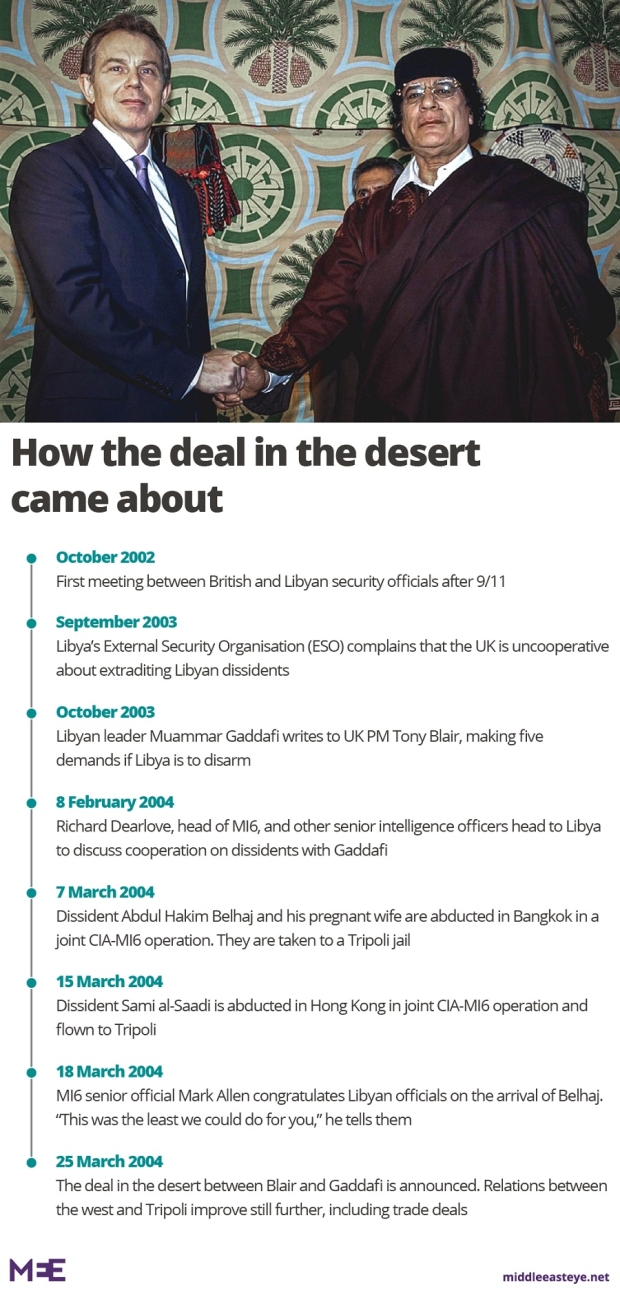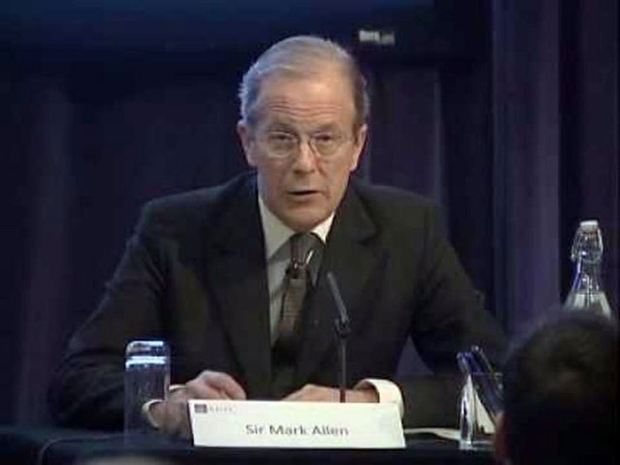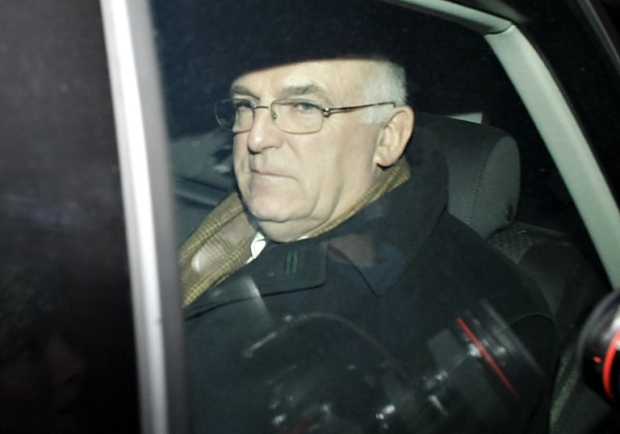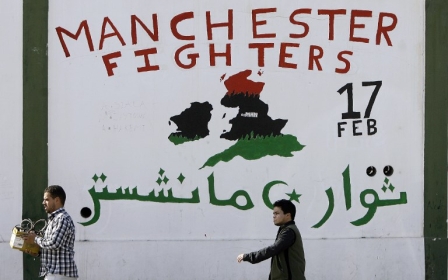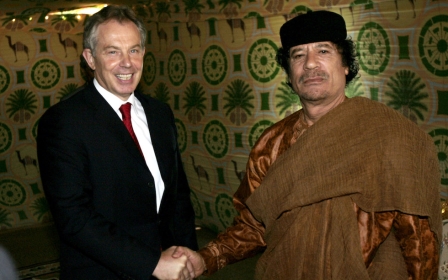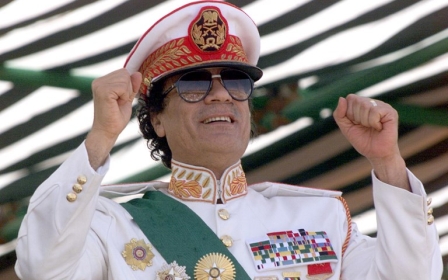REVEALED: How British spy chief courted Gaddafi on secret Libya visit

Libyan intelligence documents, disclosed as part of a British court case, have revealed fresh details about how the British government and its MI6 intelligence agency forged links and worked secretly with Muammar Gaddafi and his spy chiefs in the years after the 9/11 al-Qaeda attacks in the US in 2001.
The documents show how the UK’s intelligence services:
- characterised the British Muslim community as a potential security threat
- invested rapidly in counter-terrorism in the wake of 9/11
- struck a deal with Libya to share intelligence about other nations including Turkey, the UK's NATO ally
The papers emerged on Monday during the latest high court hearing relating to the case of Abdul Hakim Belhaj, an opponent of Gaddafi and prominent member of the Libyan Islamic Fighting Group (LIFG). In 2004 Belhaj was seized in Bangkok and taken to a jail in Tripoli, along with his pregnant wife, in a joint CIA-MI6 operation.
The hearing was the latest in Belhaj's attempt to get an apology from the British government in a case that has dragged on for several years.
The tranche of documents includes copies of memos from Gaddafi’s External Security Organisation (ESO), describing discussions between it and senior British spies, including Richard Dearlove, the then-head of MI6.
British government lawyers have not challenged the authenticity of the documents. MEE has been unable to independently verify whether the memos provide an accurate account of the meetings they describe.
MI6 chief flies into Libya
According to the documents, a delegation headed by Dearlove and Mark Allen, MI6’s director of foreign affairs, flew into Libya on 8 February 2004 aboard a private plane for talks on "bilateral cooperation" in "tracking dangerous members and exchanging information about them".
The British appeared keen to persuade the Libyans to work with them - despite having some scruples over "legal difficulties", the documents say.
They also show how British intelligence officials, as part of an "overview of the strategy of combating extremism and terrorism", described a drastic overhaul of intelligence resources in light of what was perceived as a growing threat posed by Islamic militants after 9/11.Before 9/11, the documents say, "there was only 25 people working in the Counter-Terrorism Department, and that represents five percent of the staff.
"Now 30 percent of the MI6 staff work at the Counter-Terrorism Department and 50 percent of the MI5 staff work in that department".
The meeting came a month before the so-called "deal in the desert", struck in March 2004 between British prime minister Tony Blair and Gaddafi, which came to symbolise the Libyan leader's transformation from international pariah into a western ally in the so-called "war on terror".
The agreement was seen as a significant step in bringing Gaddafi in from the cold after years of isolation after Libya's alleged role in militant attacks, including the bombing of a plane over Lockerbie in Scotland in December 1988, which killed 270 people.
Read: Mark Allen, the spy who wrote too much
The Libyan leader had by then already agreed to renounce his weapons of mass destruction programme and cooperate with the British and Americans on security matters, while British oil firms earned lucrative contracts following the deal.
The documents are the latest to shed light on the clandestine relationship between the two countries in the decade between the 9/11 attacks and the Libyan revolution, which toppled Gaddafi in 2011.
After the Libyan leader was deposed, documents exposing the UK's role in the abduction of two Libyan dissidents - including Belhaj - were found in the ransacked offices of Moussa Koussa, Libya's former foreign intelligence chief.
The documents included a fax to Koussa from Allen, in which the UK official claimed credit for Belhaj's abduction, adding: "This was the least we could do for you and for Libya to demonstrate the remarkable relationship we have built in recent years.”
'Religious terrorism' in Britain
The summary of the February 2004 meeting attended by Dearlove also offers insight into MI6’s assessment of the threat posed by British Muslims. The comments were made more than a year before the British government introduced a range of counter-terrorism measures after the July 2005 London bombings, putting it on a collision course with sections of the Muslim community which regard them as discriminatory.
MI6 identified three areas of focus under what it termed “religious terrorism”, according to the memo:
- “A general level that includes all the Muslims in Britain, totally [sic] 2 millions and they are subject to recruiting"
- “Elements connected to terrorist organisations, especially in countries in North Africa, are involved in criminal operations such as forgery and illegal migration"
- “Leaders and key elements of organisations such as Al-Qaeda. These elements have 'chemo-biological’ abilities"
The British also agreed for Libyan officers to operate on the streets of the UK, alongside its domestic intelligence service MI5, and assist in surveillance operations against British-based Libyan dissidents.
The agreement contrasts with a memo dating from September 2003, in which Libyan officials expressed their dissatisfaction at British cooperation in relation to the cases of Libyan dissidents including Sami al-Saadi and Belhaj.
However, by late March 2004, only weeks after Dearlove's visit to Libya, both al-Saadi and Belhaj were in Libyan jails, having both been kidnapped in joint CIA-MI6 operations.
The British government proscribed one of those organisations, the Libyan Islamic Fighting Group (LIFG) as a "terrorist organisation" in 2005 for its alleged links to al-Qaeda, with many Libyan exiles in the UK with links to the group placed under control orders, a form of house arrest.
Yet when the revolution against Gaddafi began in 2011, Britain's foreign policy shifted the other way, with the security services encouraging former control order detainees to travel to Libya to take up arms against Gaddafi.
Deals struck between the two security agencies included a commitment to "work together and exchange information in specific areas" including on Iran, Iraq, Mali, Mauritania, Nigeria and Turkey.
The two sides also agreed to further "cooperation in the field of internet monitoring" and to set up a direct line "for reporting the sites that must be monitored due to the lack of Arabic speakers at the British foreign office".
The delegation then headed to Algeria on the 9 February, the documents say.
Below: A Libyan External Security Organisation memo describing the visit of an MI6 delegation headed by Richard Dearlove to Tripoli in 2004
Cori Crider, Belhaj's lawyer, told MEE that the latest documents confirmed that the British government had "purchased the deal in the desert with Gaddafi at a steep human price" including by "helping the rendition of women and children".
"Years into our case, the UK is desperate not to say which officials knew this was going on at the time. But while MI6 and ex-Blair officials were quick to point fingers at each other in the press, the evidence suggests that neither side came out of the deal with entirely clean hands," said Crider.
A Foreign and Commonwealth Office spokesperson told MEE: "As legal proceedings are ongoing it is not appropriate to comment."
- Richard Norton-Taylor contributed to this report.
Middle East Eye propose une couverture et une analyse indépendantes et incomparables du Moyen-Orient, de l’Afrique du Nord et d’autres régions du monde. Pour en savoir plus sur la reprise de ce contenu et les frais qui s’appliquent, veuillez remplir ce formulaire [en anglais]. Pour en savoir plus sur MEE, cliquez ici [en anglais].


